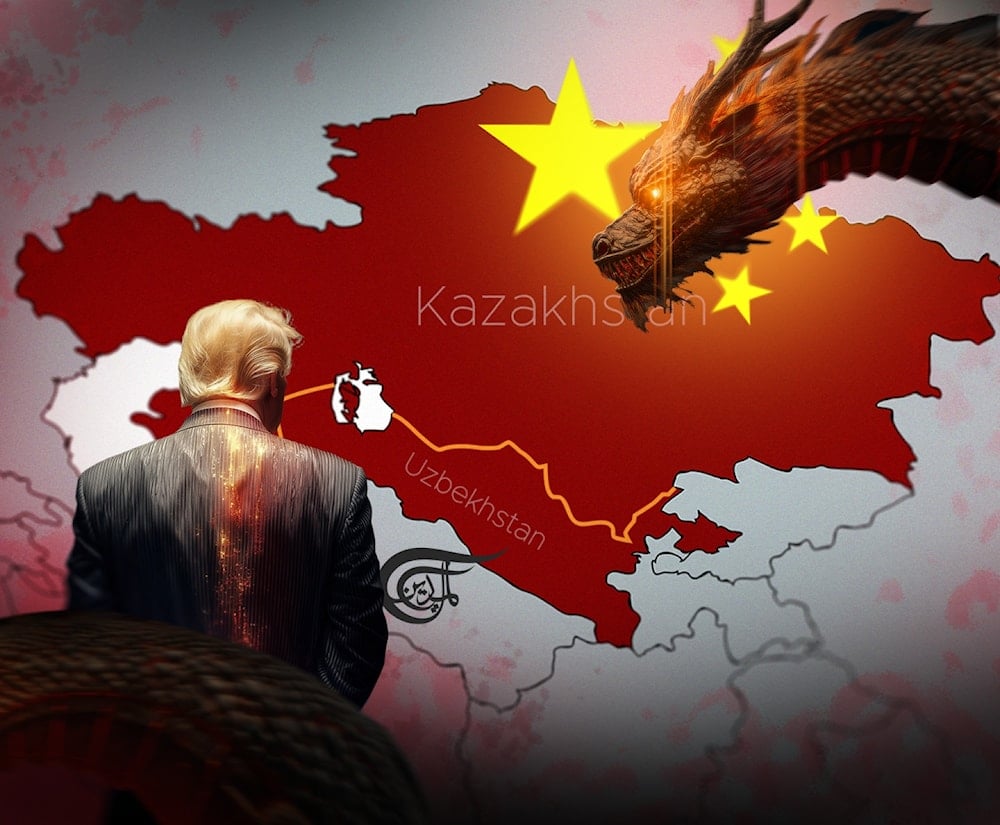The scramble for Central Asia: Why US is rushing to push normalization, rare earths deals out of Kazakhstan
As the US fearmongers about Iran and Russian "influence" being in their "backyard" in sabre-rattling and beating the drums of war against Venezuela, they are also working their way onto the Iranian, Chinese, and Russian doorstep.
-

Scramble, not strategy — Trump chases Central Asia’s resources as China tightens its grip (illustrated by Ali al-Hadi Shmeiss; Al Mayadeen English)
Trump’s November 6 summit with Central Asian leaders brought a number of deals. The US president announced a $35 billion investment by Uzbekistan into "key American industries" – though this wasn’t confirmed by either government, but did include investments in “geological surveying for critical minerals, water conservation technologies, soybean purchases, cotton exports and artificial intelligence.”
His meeting with Kazakhstan culminated in the signing of 29 bilateral agreements, valued at approximately $17 billion, including $1.1 billion in tungsten exploration.
Nestled between Russia, China, and Iran, Central Asia is situated in the heart of a meeting point between Eurasian civilizations, with its place as the Silk Road passageway between East and West. Its cultural and social attributes pay homage to Russian, Chinese, Persian, and Turkish influence at various points in time, and its geography, as well as mineral wealth, draw the interest of the world’s superpowers.
The most critical part of Trump’s trade war was waged earlier this year. In turn, China has imposed export controls on its rare earths. China supplies 90% of the world’s supply of rare earths and was the source of 70% of the US’ supply from 2020 and 2023, a critical supplier for years.
Rare earths power much of the world’s technology, with the US’ war machine being no exception – an industry which took a big hit with Chinese export controls. China placed them first in late 2023 on rare earths via licensing prerequisites that necessitated detailed end-use documentation and user verification requirements. These measures notably impacted gallium, germanium, and alimony used in military equipment. While they were placed in response to US controls on Chinese chip components, some alleged that they were China’s quiet response to the US’ genocidal war on Gaza.
A report from the US think-tank Center for Strategic and International Studies (CSIS) last month detailed Chinese measures, requiring Chinese government approval to sell items with rare earths, would have denied many US military companies material used to make F-35 fighter jets, nuclear attack submarines (which, for at years have been retiring faster than they’re being produced), Tomahawk missiles, radar systems, Predator UAVs, and smart bombs.
China is already outpacing the US in its production scale; in 2022, it was estimated that Beijing was acquiring high-end weapons and their systems 5 to 6 times faster than Washington.
So while Trump projects triumph on TruthSocial, it’s clear that the US is turning to Central Asia in a hasty and desperate scramble to replace and grab hold on an alternative supply of these resources – Kazakhstan alone boasts 43% of the world’s uranium, and Central Asia as a whole holds 39% of global manganese, 30% of global chromium, 20% of the world’s lead, 13% of its zinc, and 9% of titanium (critical for jet engines and fighter jet air frames).
Can, in turn, the US really project itself as a credible alternative to China in infrastructure development to these countries, as the quid pro quo in these deals outlines? Much of China’s effectiveness in projecting soft power in the Global South and so-called "developing" countries in recent years has come from its successful and speedy infrastructure construction. The US, to the contrary, cannot even construct infrastructure in its own country. Soft power that relies on propaganda, deception, illusions, and false idealism over material deliverables is no longer convincing.
One of the hallmarks of the November 6 meeting was that the US also sought guarantees from Kazakhstan to join the "Abraham Accords". Again, while being lauded as another diplomatic "victory" by Trump, it is a question as to just how much this can be even considered a tactical, or even a symbolic victory. Kazakhstan has had relations with “Israel” with full recognition since the 1991 collapse of the USSR, after which Kazakhstan became an independent state. The purpose of the "Abraham Accords" was to get Arab Muslim regional nations on board with normalization with “Israel” to isolate Iran and extinguish the Palestinian cause, giving it the regional carte blanche for total occupation. The member states of the accords – Bahrain, UAE, Morocco, and Sudan – were typically Arab countries that, while on paper do not recognize “Israel", already had ties to Tel Aviv due to a shared political and material connection as US compradors and vassal states.
In the 2 years after the Al-Aqsa Flood and nearly one year into his second term, Trump could not find one Arab or close regional country to sign onto the "Abraham Accords". Even Saudi Arabia – which was at the verge of normalization in September 2023 – is now refusing to recognize “Israel” "until an independent Palestinian state is first established." While Riyadh’s actions – in support of the US and “Israel” in shooting down Yemeni missiles or engaging in intelligence, espionage against Yemen or in putting diplomatic pressure against the Resistance in Lebanon – speak louder than words, its hesitancy to fully jump aboard open normalization has marked a victory as one of Al-Aqsa Flood’s original objectives: to break not only “Israel’s” illusion of security, but of the trajectory of Arab state normalization.
Hamas released a statement condemning Almaty’s position in making overtures to support the accords as a betrayal of the unified Arab and Muslim religious and political obligation to reject the occupation, a pan-Islamic stance the Resistance group has tried to mobilize in support of post-Al-Aqsa Flood. It’s clear that Trump is using Kazakhstan, in a region and amid nations perceived by the US as having the least affinity, even at the symbolic or rhetorical level, for the Palestinian cause amongst Muslim nations, as a spring board to push Saudi Arabia and other key regional Arab states to sealing the deal on normalization and winning regional consent in extinguishing any prospect of Palestinian sovereignty.
It is also expected that Uzbekistan and Azerbaijan, with Baku conveniently being at Iran’s doorstep, will be next. And the US president is on a tight deadline – the topic is likely to be a center of discussion ahead of Saudi Crown Prince Mohammad bin Salman’s trip to Washington on November 18. In February, Trump even lied and claimed Riyadh had dropped its demand during remarks at a White House meeting with Netanyahu sitting by his side, a statement even Riyadh had to correct.
In turn, Kazakhstan is seeking to boost its favorability with the US after enjoying a considerable upturn in foreign direct investment – enjoying 63% of Central Asia’s total FDI – at $10 billion in the first half of the year, with 80% of infrastructure projects above $1 billion in landlocked countries taking place there. As a landlocked country nestled between Russia and China, Kazakhstan and other CIS states are capitalizing on their physical proximity to Russia and China while balancing it with their Western political and economic ties.
The US assembled and rushed to meet with CIS leaders to do damage control on the impact of Trump's tariffs, while recently instated measures were rolled back amid the US president's meeting with Chinese President Xi. Though on top of the US’s existing lagging production, the export controls took their hit on speed, instating supply delays of 3-6 months, an increase in costs of restricted material by up to 40% and up to 2 years to an alternative source for certain materials. And the tension, despite the brief respite in recent talks, is bound to flare again.
As the US fearmongers about Iran and Russian ‘influence’ being in their ‘backyard’ in sabre-rattling and beating the drums of war against Venezuela, they also are working their way onto the Iranian, Chinese and Russian doorstep, with the “Abraham Accords” possibly transforming themselves into a “moderate” (read: compliant) Muslim NATO right on Tehran’s border.

 Julia Kassem
Julia Kassem
 8 Min Read
8 Min Read











